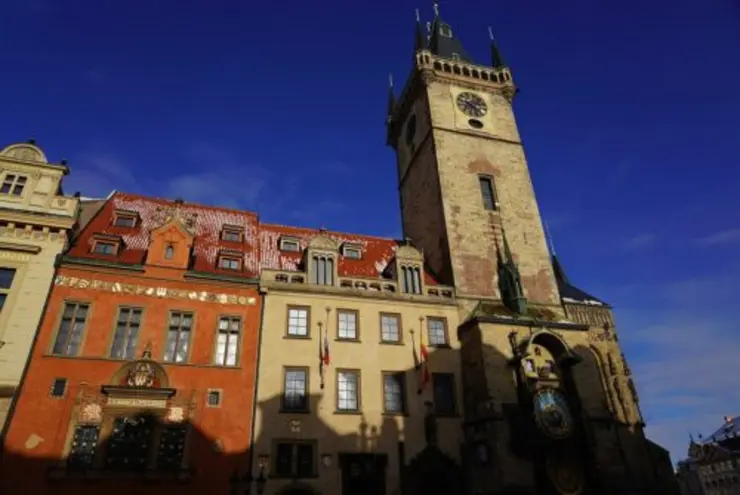Urban Governance and Civic Participation in Words and Stone
In the 2021/22 winter term, Susanne Rau, one of the spokespersons of the KFG, and our former fellows Zoë Opačić and Katalin Szende organised a lecture series of renowned speakers, who traced the origins of civic participation in political thought and explored its forms of expression in written and visual media from Late Antiquity to the 17th century. The lecture series was hosted by the Central European University’s Democracy Institute in cooperation with the Humanities Centre for Advanced Studies Religion and Urbanity. All videos of the lecture series are available as videos below.
At the beginning of ther series in October 2021, Susanne Rau commented that: “I am very much looking forward to this lecture series – because we can learn a lot about the history of democracy here. However, this history does not begin with the implementation of the right to vote in the 19th century, as it is often portrayed. We have to go back to medieval and early modern cities to learn about the invention of an art of governance and civic participation. The lecture series will be an exciting journey into the past of our cities”.
Katalin Szende, another organizer, pointed out that “Citizenship and civic participation are hot topics in current political discourse, not least because of the limitations imposed on their practices by various stakeholders. We have invited renowned experts to examine these notions through a critical lens and against a longer historical perspective, in the Middle Ages and the Early Modern period. The talks to which we cordially invite you will explore their forms of expression in written and visual media and their reflection in political thought, replacing outdated common assumptions with insights from new research”.
To this, Zoë Opačić added: “This exciting and timely lecture series will help us examine medieval and early modern roots of our civic and urban societies – the institutions, systems and practices that hold us together as individuals and allow us to prosper but also divide and oppress. As an art historian I especially look forward to the wealth of visual material we will encounter across time and space. The tone is set by our poster image of Prague’s iconic Town Hall. A symbol of the city and its governance in the Middle Ages with an imposing tower and an astronomical clock, it was vastly extended in neo-Renaissance style in the 19th century, only to be blown up at the end of World War Two destroying its precious archives. Democracy is indeed very fragile and forged over a long period of time.”
The lecture series is followed by an adjoining summer university course, focusing on the same theme from a central European perspective. For more details and registration, see the course website. The summer university will take place between 10 and 19 July 2022, in Budapest and Prague, and is recommended for graduate students and junior faculty members.
Update: Here you can find a report on by the CEU on its 27th Summer University, of which "Urban Governance and Civic Participation" was one part. Below you can also watch a video with impressions from the programme, filmed by Susanne Rau and edited by Lukas Damm.
Impressions from the summer university 2022
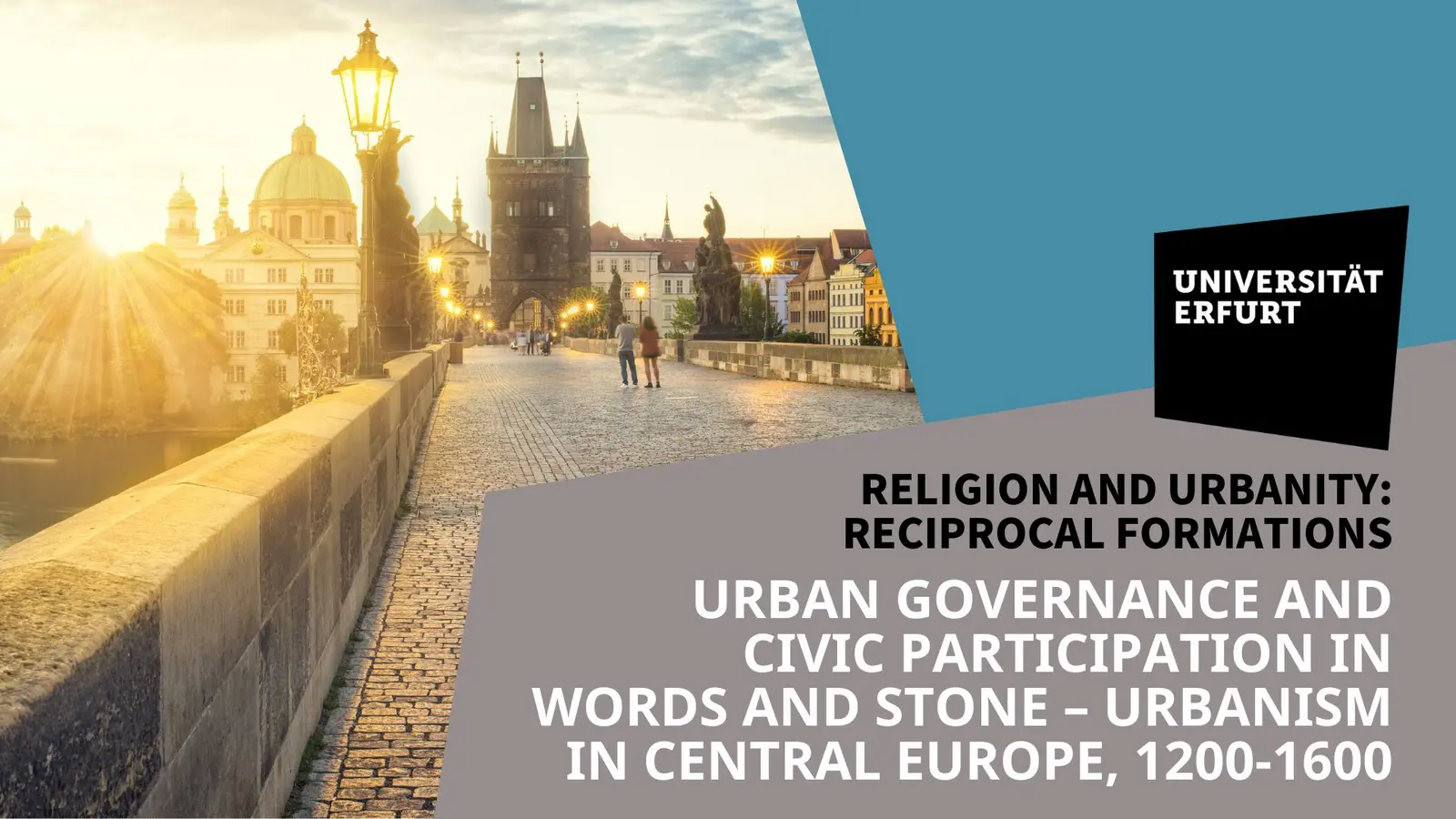
Please note: Once you watch the video, data will be transmitted to Youtube/Google. For more information, see Google Privacy.
Maarten Prak (Utrecht): "Citizenship in Europe and Premodern Asia"
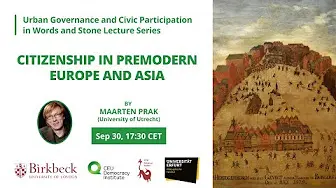
Please note: Once you watch the video, data will be transmitted to Youtube/Google. For more information, see Google Privacy.
Fabrzio Nevola (University of Exeter): "Writing on Walls in Early Modern Italy"

Please note: Once you watch the video, data will be transmitted to Youtube/Google. For more information, see Google Privacy.
Achim Timmermann (Michigan): "Calvary Is Everywhere: Capital Punishment and the Civic Imagination"
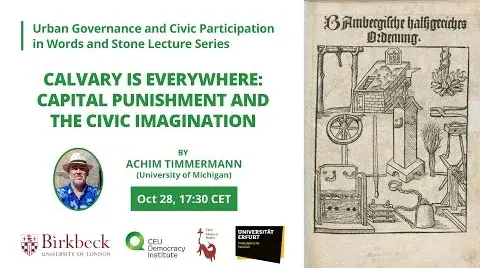
Please note: Once you watch the video, data will be transmitted to Youtube/Google. For more information, see Google Privacy.
Vanessa Harding (London): "Guilds, Fraternities and Civic Life in London, 1300-1700"
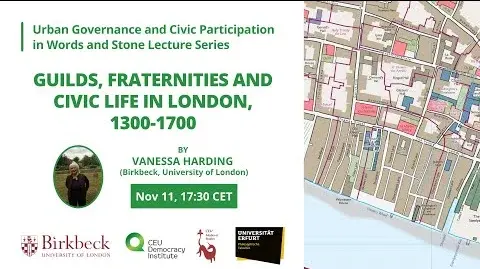
Please note: Once you watch the video, data will be transmitted to Youtube/Google. For more information, see Google Privacy.
Sara Keller – Susanne Rau (Erfurt): "Urban Governance in South Asian Cities"
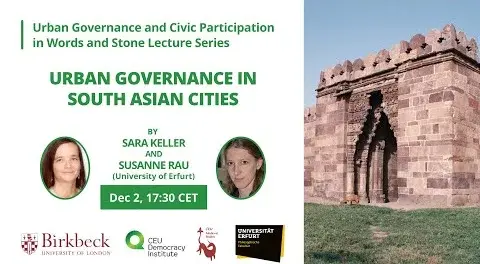
Please note: Once you watch the video, data will be transmitted to Youtube/Google. For more information, see Google Privacy.
Ferenc Horcher (Budapest): "The Political Ideology of the Renaissance and Early Modern City - From Bruni to Althusius"
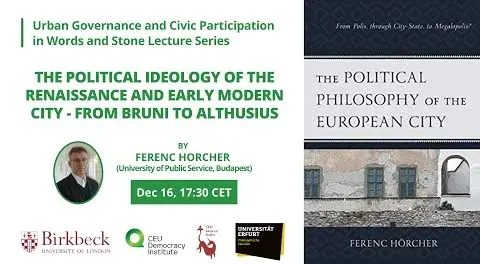
Please note: Once you watch the video, data will be transmitted to Youtube/Google. For more information, see Google Privacy.
Caroline Goodson (Cambridge): "Mediterranean Cities in the Early Middle Ages"
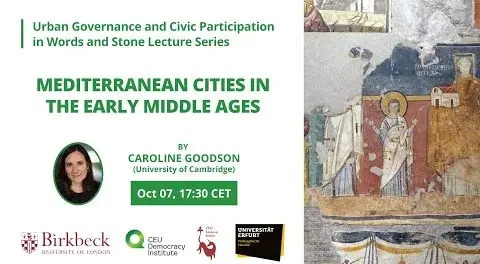
Please note: Once you watch the video, data will be transmitted to Youtube/Google. For more information, see Google Privacy.
Beat Kumin (Warwick): "Rural Subjects? Governance, Participation and Self-Representation in Imperial Villages"
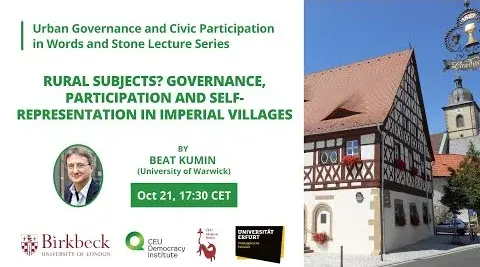
Please note: Once you watch the video, data will be transmitted to Youtube/Google. For more information, see Google Privacy.
Andreas Lehnertz (Jerusalem): "Seals and Oath-Taking: Jewish Civic Participation in the Medieval Holy Roman Empire"
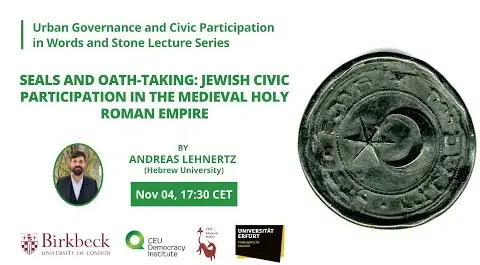
Please note: Once you watch the video, data will be transmitted to Youtube/Google. For more information, see Google Privacy.
Martin Scheutz (Vienna): "Armed Citizens in Town. Control of Weapons and Armories"
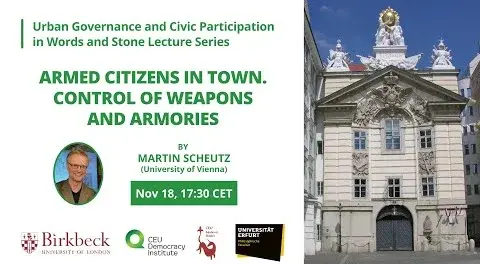
Please note: Once you watch the video, data will be transmitted to Youtube/Google. For more information, see Google Privacy.
Miri Rubin (London): "How Strange Were the Strangers of Medieval Cities?"
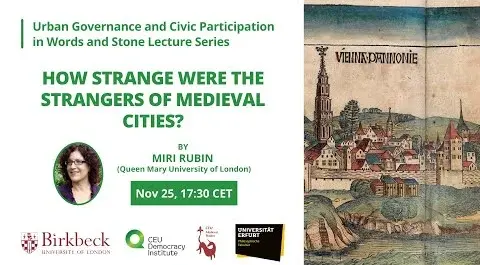
Please note: Once you watch the video, data will be transmitted to Youtube/Google. For more information, see Google Privacy.
Grigor Boykov (Vienna): When “The Land of Filibe Became Egypt and Meriç Turned Into Nile”: Governance, Architectural Patronage, and Water Management of the Mid-Fifteenth-Century Plovdiv
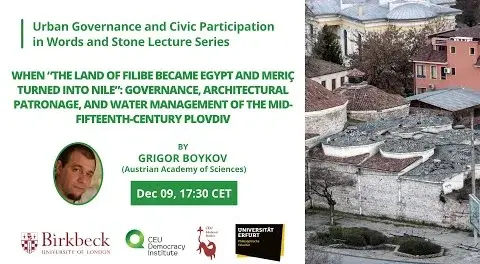
Please note: Once you watch the video, data will be transmitted to Youtube/Google. For more information, see Google Privacy.
